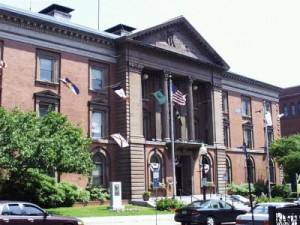Mayor Mitchell Submits City Budget For Fiscal Year 2015
 Mayor Jon Mitchell presented a $287 million Fiscal Year 2015 City Budget to the City Council on Wednesday, May 14, 2014. Mitchell signaled he would continue his no-frills spending approach in this year’s proposal, his third since taking office in January 2012.
Mayor Jon Mitchell presented a $287 million Fiscal Year 2015 City Budget to the City Council on Wednesday, May 14, 2014. Mitchell signaled he would continue his no-frills spending approach in this year’s proposal, his third since taking office in January 2012.
PRIORITIZING EDUCATION
“This year’s Budget was designed very purposefully to address what everyone recognizes as the fundamental challenge facing our City: A long-struggling public education system is undermining our children’s ability to obtain good jobs, eroding the competitiveness of local businesses, hurting our economy, and jeopardizing our future,” said Mayor Mitchell.
He added, “We can and will do whatever it takes to fix our schools, including funding them adequately, because as a community we have no choice. Our success as a city depends on it.”
The Mayor cited the cost of implementing two state-mandated turnaround plans at New Bedford High School and the Parker Elementary School as the primary reason for the need to boost school funding, noting “The plans at New Bedford High School and Parker Elementary School will cost $2.7 million alone. Given these new education obligations, simply adopting the state-mandated minimum municipal contribution to the School District is no longer a plausible alternative.”
The Mayor’s Budget includes a 6.4% increase for schools (to $116.4 million), which pegs the local contribution toward schools at roughly $2 million above what is legally required by state, and $3.3 million above last year’s level.
HOLDING THE LINE ON SPENDING
“As important a priority as education is, we still have to fund the school system in a way that recognizes the very real economic and fiscal pressures on residents and the rest of city government. Being serious about education funding also means being serious about how we handle a range of other pressing needs, and that means making some very tough decisions,” said the Mayor.
For general operating costs of city government, the Budget’s proposed increase is effectively zero (at $84.8 million). Moreover, proposed transfers pending before the City Council, if approved, would actually result in a net decrease to departmental operating expenditures between FY 2014 and FY 2015.
For mandatory contributions to employee health insurance, pensions, and debt service, the increase is just 2.8% (to $73.4 million). This reflects the ongoing challenge involved in providing health care and pensions for the City’s employees and retirees.
In an accompanying letter to City Councillors, the Mayor also justified the need to keep a tight lid on spending because the City will soon see the end of the federal “SAFER” grant funding that pays for one-third of the City’s firefighters.
SAVINGS FROM REORGANIZING GOVERNMENT
“Many families and seniors continue to fight each month to make ends meet and pay the bills that allow them to remain in their homes. Effective cost control–so that city government is as affordable as possible–has therefore been a fundamental starting point for every budget I have crafted since taking office, and this year is no different,” said Mitchell
The Mayor noted how a range of reforms the Administration put in place over the past two years have assisted this year’s budget planning, helped restrain spending, and lessened the need for tax revenue.
The proposed Budget benefits greatly from recent reorganizations and department consolidations. Last year a significant restructuring affected four major city departments (DPI, DPF, Community Development, and Planning) whose employees combined total 270 out of 1,100 municipal workers (excluding school employees).
The successful negotiation of eleven new Renewable Energy Power Purchase Agreements is also allowing the City to purchase “green” energy at deeply discounted prices, with roughly $30 million in electricity savings expected over the next 20 years.
The Mayor added, “Our reforms are helping ease the burden on taxpayers, putting the City in a more stable financial position, and improving conditions for future economic growth–as evidenced by the recent upgrade to the City’s bond rating to its highest in forty years.”
BUDGETARY PRESSURES AND REVENUES
The Mayor was clear that the budgetary pressures of fixed costs (health, pension, etc.) as well as schools, suggest a necessity for some increase in the City’s real estate levy later this year. The City has engaged in a sustained, successful effort to forego tax increases for the past four years.
The Mayor noted that holding the line on any tax increase for a four-year period is a remarkable accomplishment for a Gateway City. New Bedford now has the third highest capacity of untapped levy in percentage terms among all 22 Gateway Cities.
Mayor Mitchell said, “At this point in the fiscal year it is not possible to pinpoint precisely what this Budget will mean for the tax levy, but residents can know this–I am not going to sit idle between now and when the levy is established next December. Instead, my Administration is committed to finding additional ways to mitigate the impact of levy requirements of this Budget on residents and businesses.”
He added, “We intend to take further action as more information becomes available in the months ahead regarding changes in projected growth, valuation revisions, and state and local resources that may become available.”